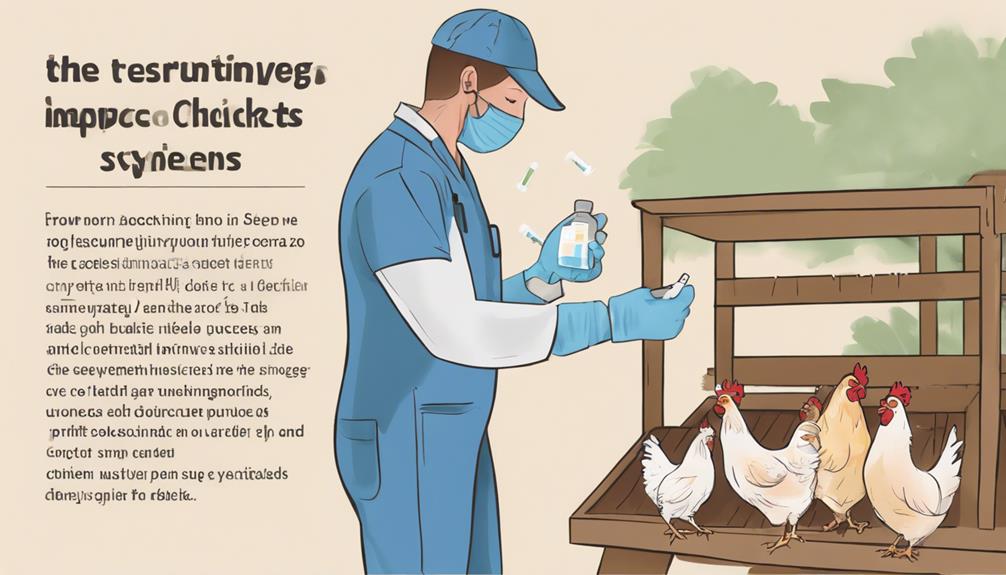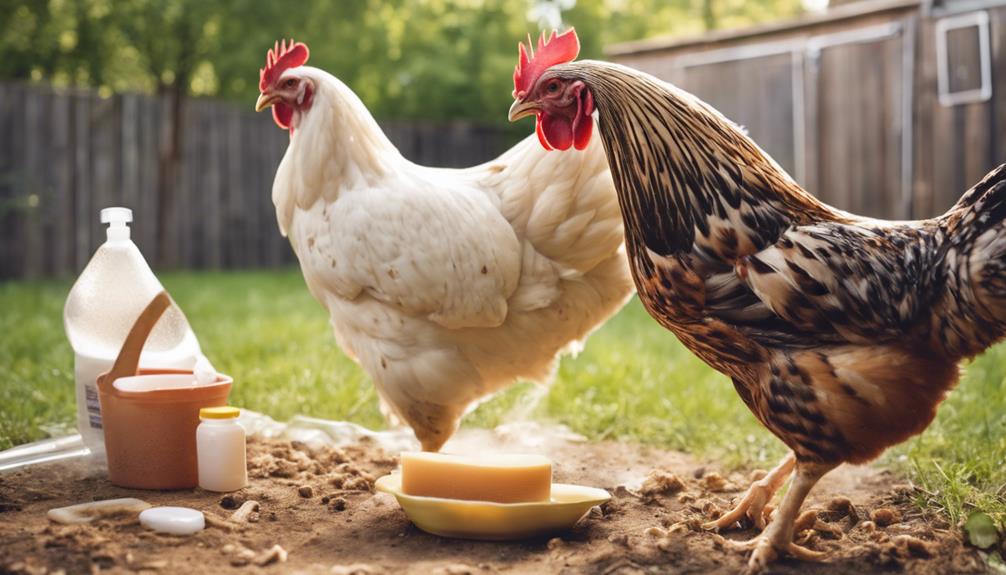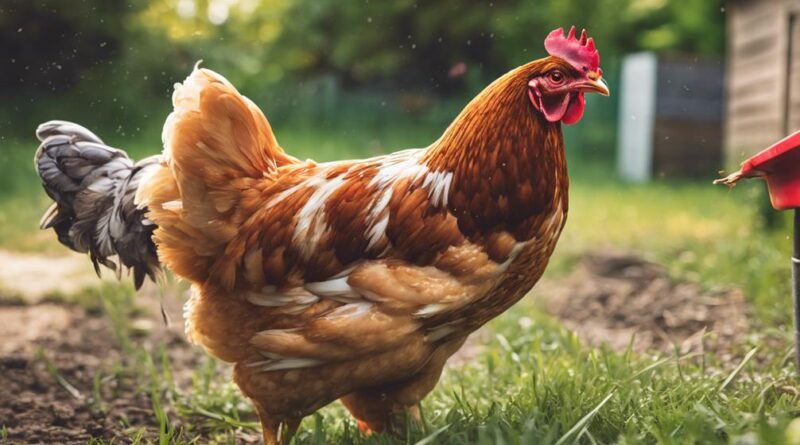Top 10 Tips to Combat Common Backyard Chicken Diseases"
You've dedicated time and effort to nurturing your backyard flock, but have you considered all the preventive steps to protect them from common diseases? From spotting early symptoms to maintaining optimal hygiene, there are crucial strategies that can safeguard your chickens' health. By implementing these top 10 tips, you'll not only enhance their well-being but also ensure a thriving environment for your beloved feathered friends.
Identifying Disease Symptoms
To effectively combat backyard chicken diseases, it's crucial to accurately identify disease symptoms early on. Disease prevention starts with early detection. Keep a close eye on your flock and be vigilant for any signs of illness. The key to successful disease management lies in prompt action upon recognizing symptoms.
Symptom recognition is a vital skill for any backyard chicken owner. Common signs of disease include changes in behavior, reduced egg production, abnormal discharges, coughing, sneezing, and lethargy. If you notice any of these symptoms, it's important to act quickly. Isolate the affected chicken to prevent the spread of illness and consult a veterinarian for proper diagnosis and treatment.
Quick response is essential when it comes to combating backyard chicken diseases. Delay in addressing symptoms can lead to further complications and potential spread to other members of the flock. By acting promptly, you not only increase the chances of successfully treating the affected chicken but also safeguard the health of the rest of your flock.
Maintaining Clean Coops
Maintaining clean coops is fundamental in preventing the spread of disease among your backyard chicken flock. A regular cleaning schedule is crucial to ensure a healthy environment for your chickens. Start by removing droppings, soiled bedding, and any leftover feed daily. This will help reduce the presence of harmful bacteria and parasites that thrive in dirty conditions. Deep clean the coop on a weekly basis by removing all bedding, scrubbing the surfaces with a disinfectant solution, and allowing everything to dry thoroughly before adding fresh bedding.
Proper coop ventilation is also vital in maintaining a clean and healthy environment for your chickens. Good air circulation helps reduce moisture levels, which can lead to mold growth and respiratory issues in chickens. Make sure your coop has adequate ventilation openings that can be adjusted based on the weather conditions. This will help regulate the temperature inside the coop and prevent the buildup of ammonia from chicken droppings.
Incorporating these practices into your chicken care routine will go a long way in preventing common diseases that can affect backyard flocks. By staying proactive with cleaning and ventilation, you can create a safe and comfortable living space for your chickens, promoting their overall health and well-being.
Proper Nutrition and Supplements
Ensuring your backyard chickens receive proper nutrition and supplements is essential for their overall health and well-being. Nutritional balance plays a crucial role in keeping your chickens healthy and productive. A well-rounded diet should include a mix of grains, greens, and proteins. Commercial chicken feeds are convenient and formulated to meet the dietary needs of different chicken breeds. However, supplementing their diet with kitchen scraps, fruits, and vegetables can provide additional nutrients and prevent boredom.
When it comes to supplement options, there are several to consider. Calcium supplements, such as crushed eggshells or oyster shells, are essential for laying hens to maintain strong eggshells. Grit, which is small rocks or coarse sand, aids in the digestion process by grinding food in the gizzard. Probiotics can help maintain a healthy gut flora and improve digestion. Additionally, offering vitamins and electrolytes during times of stress or illness can support your chickens' immune system.
Maintaining a balanced diet and providing appropriate supplements can prevent nutritional deficiencies and common health issues in backyard chickens. Remember to consult with a poultry nutritionist or veterinarian to ensure that your chickens are receiving the necessary nutrients for their optimal health.
Implementing Biosecurity Measures
Implement biosecurity measures to safeguard your backyard chickens from potential diseases and infections. Disease prevention is crucial to maintaining a healthy flock. Biosecurity measures help prevent the introduction and spread of pathogens that can harm your chickens. Here are some practical steps you can take to enhance biosecurity on your premises.
Firstly, control access to your chicken coop and run. Limiting who enters these areas reduces the risk of introducing diseases. Use footbaths with disinfectant, provide dedicated coveralls and boots for anyone entering the coop, and discourage visitors from other poultry farms.
Secondly, keep your coop clean and dry. Regularly remove droppings, replace bedding, and ensure good ventilation to reduce moisture levels. Clean and disinfect feeders and waterers frequently to prevent the buildup of harmful bacteria.
Thirdly, quarantine new birds before introducing them to your existing flock. This helps prevent the spread of any potential diseases they may be carrying. Observe new birds for signs of illness, such as sneezing, coughing, or lethargy, before integrating them.
Lastly, be cautious when interacting with other poultry owners and their birds. Avoid sharing equipment, such as feeders or waterers, and limit contact with birds from other flocks to minimize the risk of disease transmission.
Regular Health Checks
Regular health checks are essential for monitoring the well-being of your backyard chickens and catching any potential issues early. Preventive care plays a crucial role in maintaining the health of your flock. Conducting regular health checks allows you to observe your chickens closely, enabling you to spot any signs of illness or distress promptly.
Health monitoring involves regularly inspecting your chickens for any abnormalities. Check their overall appearance, behavior, and droppings daily. Look out for symptoms such as lethargy, abnormal discharges, changes in appetite, or lameness. By keeping a close eye on your chickens, you can detect health issues early on, increasing the chances of successful treatment.
During health checks, pay attention to the hygiene of your coop and nesting areas. Cleanliness is key to preventing diseases. Ensure that bedding is dry, coop is well-ventilated, and feeders/waterers are clean. Regularly clean and disinfect the coop to minimize the risk of infections.
Additionally, maintaining proper nutrition and providing access to fresh water are vital components of preventive care. A well-balanced diet rich in essential nutrients strengthens the immune system, helping your chickens fight off diseases more effectively. Ensure that your chickens have access to clean water at all times to prevent dehydration and maintain overall health.
Incorporating regular health checks into your routine is a proactive approach to safeguarding your flock against common backyard chicken diseases. By staying vigilant and implementing preventive measures, you can promote the well-being and longevity of your feathered friends.
Quarantine New Birds
To safeguard your existing flock from potential diseases, consider quarantining any new birds you introduce to your backyard chicken coop. Disease prevention is crucial in maintaining the health of your entire flock. Follow these steps to establish an effective isolation protocol:
- Set Up a Separate Quarantine Area: Designate a specific area away from your main coop to house the new birds. This will prevent direct contact with your existing flock, reducing the risk of disease transmission.
- Observe for Symptoms: Monitor the new birds closely for any signs of illness during the quarantine period. Look out for symptoms such as lethargy, sneezing, coughing, or abnormal feces.
- Practice Good Biosecurity Measures: Wash your hands thoroughly after handling the quarantined birds, and use separate equipment to care for them. This helps prevent the spread of any potential diseases.
- Consult a Veterinarian: If you notice any concerning symptoms in the new birds, seek advice from a poultry veterinarian. Early detection and treatment can help prevent the spread of diseases to your existing flock.
- Quarantine Period: Maintain the quarantine for a minimum of 30 days to ensure that the new birds are healthy before introducing them to your main flock.
Vaccination Protocols

Establishing a comprehensive vaccination schedule is crucial for safeguarding your backyard flock against common poultry diseases. Vaccines play a key role in preventing various illnesses that can affect your chickens. Ensuring that your birds receive the necessary vaccinations can significantly improve their overall health and well-being.
Vaccine effectiveness is a critical factor to consider when implementing a vaccination protocol for your chickens. Vaccines work by stimulating the bird's immune system to produce antibodies against specific pathogens. When administered properly and at the right time, vaccines can provide strong protection against diseases such as Newcastle disease, infectious bronchitis, and Marek's disease.
To maximize disease prevention, it's essential to follow recommended vaccination protocols based on your region and the prevalent diseases in your area. Consult with a poultry veterinarian to develop a tailored vaccination schedule that meets the specific needs of your flock. Keep detailed records of when each vaccine was administered and when boosters are due to ensure continuous protection.
Remember that vaccines are just one part of a comprehensive disease prevention strategy. Good biosecurity practices, proper nutrition, and regular health checks are also crucial for maintaining a healthy flock. By prioritizing vaccination protocols and overall flock management, you can help protect your backyard chickens from common poultry diseases.
Parasite Prevention
When it comes to safeguarding your backyard flock's health, addressing parasite prevention is as important as establishing a vaccination protocol. Parasites can wreak havoc on your chickens if left unchecked, but with the right strategies, you can keep them healthy and thriving.
Here are some practical tips for parasite prevention:
- Regularly Clean Coops and Nesting Areas: Keeping your coop clean and dry helps prevent parasites from establishing a home in your chicken's living space.
- Practice Free-Range Rotation: Allowing your chickens to free-range in different areas of your yard can help break parasite life cycles and reduce infestations.
- Add Garlic to Their Diet: Garlic is a natural dewormer and can help prevent internal parasites in your chickens.
- Use Diatomaceous Earth: Diatomaceous earth is a natural powder that can be dusted in your coop and nesting boxes to help control external parasites like mites and lice.
- Consider Herbal Supplements: Herbal supplements like oregano and thyme can boost your chicken's immune system and help them fight off parasites naturally.
Hygiene Practices

Maintaining good hygiene practices is essential for ensuring the health and well-being of your backyard chickens. By implementing proper hygiene best practices, you can significantly reduce the risk of diseases spreading among your flock.
Here are some key disease prevention strategies to keep your chickens healthy:
- Clean Coop: Regularly clean and disinfect the chicken coop to eliminate any harmful bacteria or parasites. Remove soiled bedding, droppings, and uneaten feed promptly.
- Fresh Water: Provide your chickens with fresh, clean water daily. Make sure the water containers are free from algae and debris, as contaminated water can lead to various health issues.
- Secure Feed Storage: Store chicken feed in airtight containers to prevent contamination by pests or mold. Avoid feeding your chickens moldy or spoiled food.
- Quarantine New Birds: Before introducing new birds to your flock, quarantine them for a few weeks to ensure they aren't carrying any diseases that could spread to your existing chickens.
- Limit Contact with Wild Birds: Wild birds can carry diseases that are harmful to chickens. Minimize contact between your chickens and wild birds to reduce the risk of transmission.
Consulting a Vet
To ensure the optimal health of your backyard chickens, consulting a veterinarian regularly is crucial for early detection and effective management of any potential diseases. Your vet plays a vital role in keeping your flock healthy and happy.
Here are some reasons why consulting a vet is essential:
- Vet Recommendations: Veterinarians can provide personalized advice based on the specific needs of your chickens. They can recommend suitable vaccines, preventative measures, and dietary adjustments to enhance the overall well-being of your flock.
- Early Detection: Regular check-ups with a vet can help in early detection of any health issues. Timely identification of diseases can significantly improve the chances of successful treatment and prevent the spread of illnesses to other chickens.
- Diagnostic Tests: Vets can perform diagnostic tests to accurately identify any underlying health problems. These tests can provide valuable insights into the health status of your chickens and guide the vet in recommending appropriate treatment options.
- Treatment Options: Vets can offer a range of treatment options for various chicken diseases. From medications to surgical interventions, they can provide the necessary care to help your chickens recover and thrive.
- Emergency Care: In case of sudden illnesses or injuries, having a trusted vet to turn to for emergency care is invaluable. Vets can provide immediate assistance and critical care to ensure the health and safety of your chickens.
Frequently Asked Questions
How Can I Keep My Backyard Chickens Entertained and Mentally Stimulated?
To keep your backyard chickens entertained and mentally stimulated, incorporate enrichment activities like chicken toys and environmental stimulation through foraging games. These activities help prevent boredom and promote natural behaviors in your flock.
Chicken toys such as hanging treats or puzzle feeders can provide mental challenges, while foraging games encourage them to explore and work for their food, keeping their minds engaged and happy.
Are There Any Natural Remedies for Common Chicken Diseases?
When looking to address common chicken diseases naturally, you can explore herbal remedies, holistic treatments, homeopathic solutions, and natural supplements. These options can offer alternative ways to support your flock's health and well-being.
Remember to research and consult with a veterinarian experienced in natural remedies to ensure you're providing the best care for your chickens. With a blend of traditional and natural approaches, you can help maintain your chickens' health.
Can Backyard Chickens Transmit Diseases to Other Household Pets?
Backyard chickens can transmit diseases to other household pets through pet interactions. It's essential to be mindful of disease transmission for household safety and disease prevention.
What Are the Best Practices for Introducing New Chickens to an Existing Flock?
When introducing new chickens to your existing flock, it's essential to follow proper strategies to maintain harmony. Consider the flock dynamics and gradually introduce the newcomers to reduce stress and potential conflicts.
Keep a close eye on interactions to ensure a smooth integration process. Providing separate but adjacent spaces for a while can help them get used to each other's presence before full integration.
Patience and careful observation are key to successful introductions.
How Do I Handle Aggressive Behavior Among My Backyard Chickens?
When handling aggression among your backyard chickens, implementing training techniques can be beneficial. Understanding the social hierarchy within your flock is crucial.
Behavioral modification strategies, such as positive reinforcement and redirection, can help address aggressive behavior. By observing and addressing underlying causes, you can promote harmony within your flock.
Conclusion
In conclusion, by following these top 10 tips to combat common backyard chicken diseases, you can ensure the health and well-being of your flock. Stay vigilant in identifying symptoms, maintain clean coops, provide proper nutrition, implement biosecurity measures, conduct regular health checks, follow vaccination protocols, prevent parasites, practice good hygiene, and consult a vet when needed.
By taking proactive measures and staying informed, you can protect your chickens and enjoy a thriving backyard flock.
